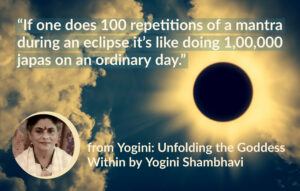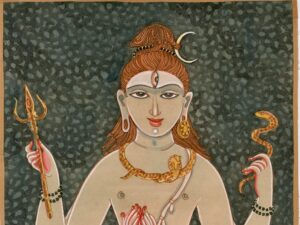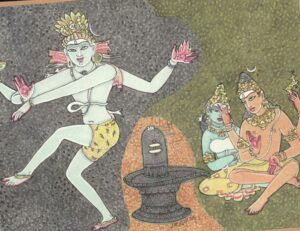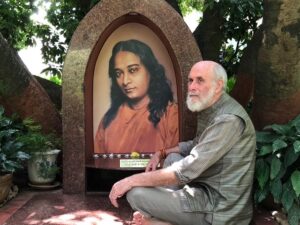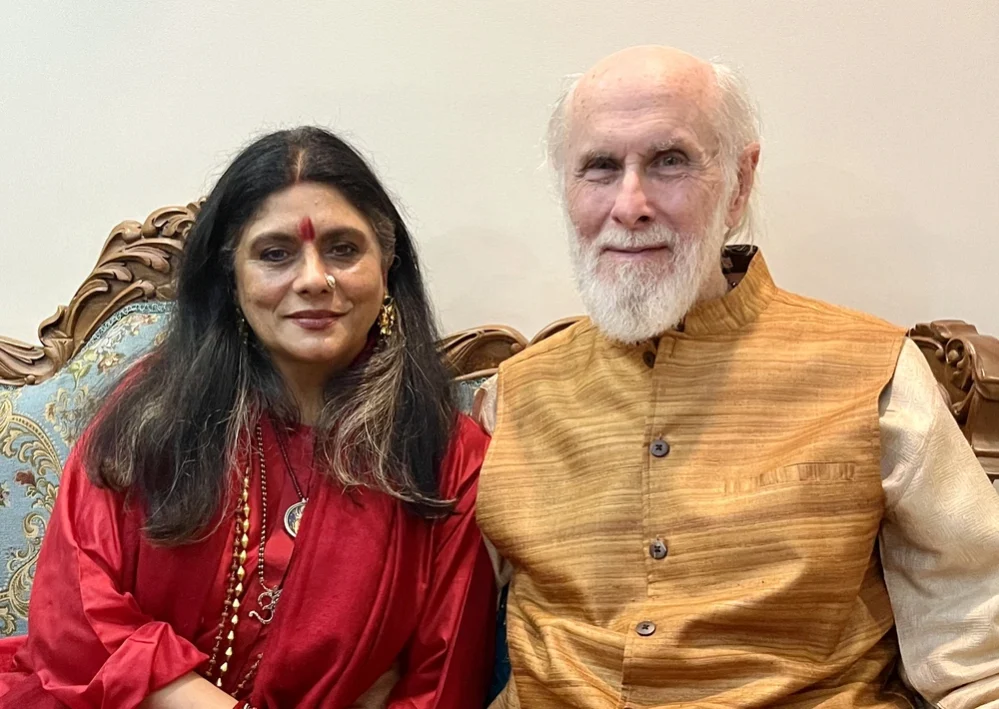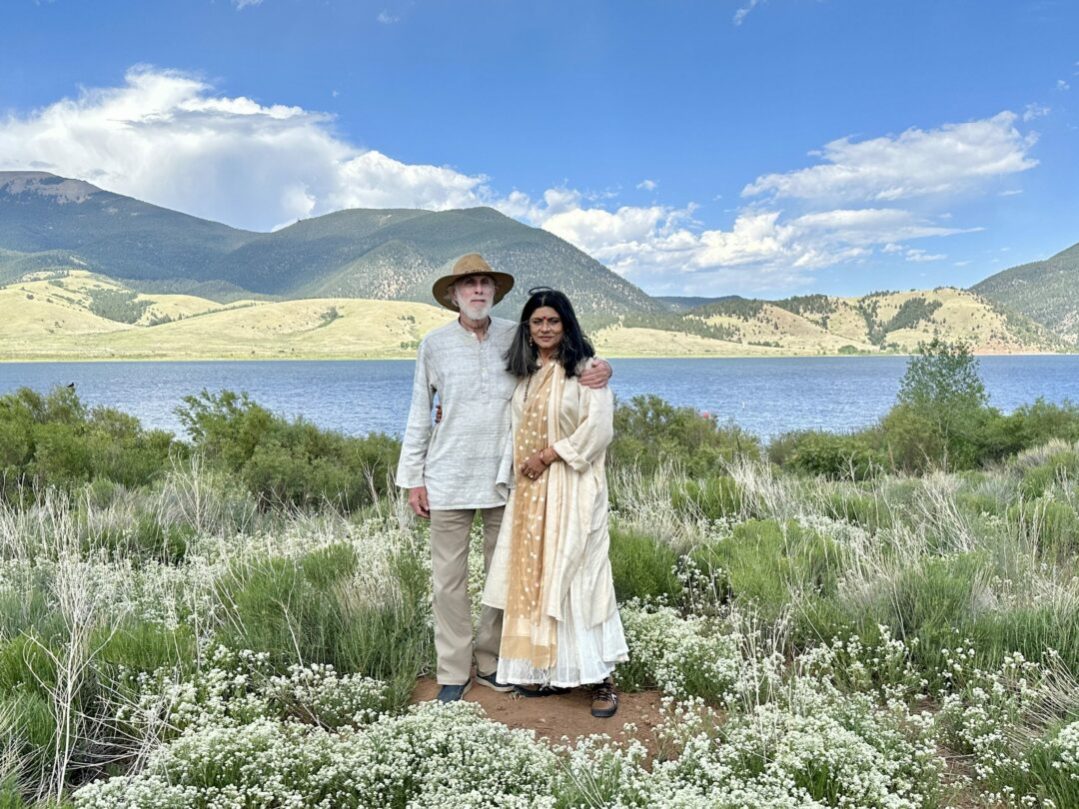Yoga means unification, which is first the unity of all the dualities and contraries that constitute the energies of life. Yoga philosophy teaches us to understand and transcend duality, but this rests upon harmonizing the dualities within us in a transformative state of balance.
Shiva and Shakti as the dual cosmic principles are an intrinsic part of all Yoga, which constitutes a natural process of integration and transformation. Recognition of the cosmic duality leads us into the practice of Yoga, which is their unification. All Yoga is a development of Shiva awareness and Shakti energy, the state of the seer and its energy of seeing, drawing the dual forces from their lower manifestations in the realm of division to their higher reality in pure Oneness.
The philosophy of Shiva and Shakti reveals the truth principles (dharmas), energies, and potentials of all creatures and all worlds. It is a system of higher knowledge rooted in the Cosmic Mind.
Shiva is pure Being and Shakti is its power of becoming on all levels.
Each world has its Shiva nature, its Self or Spirit, and its Shakti power or energy movement.
Each creature has its Shiva nature or inner Self and its Shakti or diverse manifestation.
Each one of us has our underlying Self or Shiva factor and our outer expressions through body and mind or Shakti factor. Shiva and Shakti form the Being and power of the individual soul.
Shiva is Being or the inherent reality that ever is what it is. Shakti is the power of action or doing arising from it. Shiva is beyond all action, while Shakti is its power of action on all levels. Being or the Divine presence has a tremendous power to act when the moment is appropriate, which is the expression of its Shakti. Shiva is the underlying unmanifest reality and Shakti generates its outer appearance.
Yet this duality of Shiva and Shakti, or being and action, occurs within the manifest realm as well. Every substance has its underlying essence or reality that is unchanging like the wetness of water, and its manifest relativity like the waves through which water moves.
Shiva is reality, that which is ever enduring, while Shakti is relativity, that which is ever fluctuating, arising and returning to the real. Shiva is unitary reality or common ground of being while Shakti is the web of multiplicity, relativity, relations, or interdependence that arises from its manifestation. Every aspect of the universe has a complementary duality of Being and its Power of Becoming.
Being and Power of the Three Lokas
Each Loka or realm of existence has its primary principle, being, light or Shiva factor and its manifestation, energy or Shakti factor.
Shiva is the fire that exists on Earth as its Shakti or field of manifestation.
Shiva is the lightning that exists in the atmosphere as its Shakti or field of manifestation
Shiva is the Sun that exists in heaven or space as its Shakti or field of manifestation.
Being and Power of the Five Koshas or Five Sheaths
Each of the five koshas or five coverings of the soul has its primary level of being as its Shiva factor, and its different energies and power of action as its Shakti factor.
The physical body or “food sheath” (annamaya kosha) has its overall coherence through the brain and nervous system as its Shiva factor and its diverse processes, organs or system as its Shakti.
The energy body or “pranic sheath” (pranamaya kosha) has its ruling Prana as its Shiva factor and its diverse pranic activities through the breath, motor organs and nadis as its Shakti.
The mind or “mental sheath” (manomaya kosha) has its ruling power of attention as its Shiva factor and its diverse sensory activities as its Shakti.
The intelligence or “knowledge sheath” (vijnanamaya kosha) has its ruling power of discrimination as its Shiva factor and its diverse determinations and decision-making actions as its Shakti.
The “bliss sheath” (anandamaya kosha) has its ruling power of peace and contentment as its Shiva factor and its diverse experiences of joy as its Shakti.
Being and Power of the Five Elements
Each of the five great elements has its basic nature, state of existence or Shiva factor and its diverse qualities, actions and expressions or Shakti factor.
Shiva is reflected in the nature of the earth element as dense and steady like the mountain, with Shakti as its movement or action through Earth currents and earthquakes, and its inherent power to hold and support.
Shiva is reflected in the nature of the water element as wet and fluid like the ocean, with Shakti as its movement through rivers, streams and rain, and its power to moisten and nurture.
Shiva is reflected in the nature of the fire element as hot and luminous, with Shakti as its movement through various types of fire and light from the core of the Earth to the stars, particularly fire’s power to burn.
Shiva is reflected in the nature of the air element as light and mobile, with Shakti as its movement through the wind and other currents, and its power to stimulate.
Shiva is reflected in the nature of the ether element as clear and light, with Shakti as its movement through sound and light, and its power to permeate and pervade.
Being and Power of the Eight Limbs of Yoga Practice
Each aspect of Yoga has a Shiva factor or being and an action or Shakti. The movement of Yoga is to merge Shakti back into Shiva. Generally the state of Yoga is Shiva, while the methods and practices of Yoga are Shakti.
The yamas and niyamas or yogic principles and observances serve to cultivate a calm Shiva awareness and a corresponding Shakti force of self-control.
Shiva is reflected in the stillness of the asana, with Shakti as the power to perform it and the energy that arises from it.
Shiva is the nature of the Prana in its state of control or balance, with Shakti as the power to develop it. Yet overall pranayama is more a Shakti or energizing practice.
Shiva is the principle of withdrawal or pratyahara, and Shakti the action of internalizing our energy. Yet overall pratyahara is more a Shiva or calming practice.
Shiva is reflected in the concentrated mind, and Shakti is the directed power of concentration.
Shiva is the meditative mind and Shakti is the power of meditation.
Shiva is the state of absorption or samadhi and Shakti is its power of bliss.
Alignment of Shiva-Shakti
Yoga consists of the proper alignment, balance and union of the Shiva and Shakti energies within us on all levels. The more we hold to Shiva or stillness within, the stronger, higher, and subtler our Shakti or energy level naturally becomes. For example, the greater our capacity to dwell in the state of Being, the greater our capacity for transformative action in the outer world becomes and higher planes of manifestation will be revealed to us.
Shiva is the state of balance; and Shakti is the energy of transformation that naturally arises from it. The state of balance is not a mere neutral zone, like a scale held static between equal weights on either side. Whenever we reach a state of balance, the energy is naturally taken to a higher level. There are many such points of balance or equilibrium that we can cultivate in Yoga, whether it is a still asana, relaxation of the breath, or meditation and equipoise of the mind.
The path of spiritual growth does not mean to deny Shakti in favor of Shiva, but to align Shiva and Shakti together in the fullest possible manner. That affirms the essence of both Shiva and Shakti. The highest Shakti is abidance in the state of the Supreme Shiva. The still point of the Absolute, that is Shiva, naturally unfolds the full manifestation of Shakti that is the entire universe.
Shakti creates all things through the presence of Shiva. All her creations are manifestations of qualities inherent within Shiva. Shiva meanwhile is the essence or inner nature behind Shakti, not a separate principle. In our outer manifestation, we are Shiva and Shakti under limitation, with a limited understanding of Self and a limited capacity for creative action. In our inner nature we are Shiva and Shakti unbounded, with an unlimited understanding and unlimited capacity for creative action.
Shaktis of the Supreme Shiva
The Supreme Shiva has its special primary powers or Shaktis. The first is Sat-Shakti, the power of Sat or pure Being. The power of Shiva to be what he is. From that root Sat-Shakti five higher Shaktis manifest.
Chit-Shakti, the power of consciousness that carries the light of Shiva withdrawn into itself.
Ananda-Shakti, the power of bliss that reflects the nature of Shakti as the supreme creative force.
Iccha-Shakti, the power of will that gives ruling power to Shiva as the lord of all.
Jnana-Shakti, the power of knowing on all levels, that is the basis of the higher mind and intelligence in creatures.
Kriya-Shakti, the power of transformative action, including the Yoga Shakti, spiritual practices and the unfoldment of Kundalini.
The last three Shaktis form a triad of “Iccha, Jnana and Kriya” or “Will, Knowledge and Action” that develop in an integral manner and are reflected in the functions of various deities. They are the three manifestations of Shakti as Ananda, which is the cause of all manifestation. Shiva and Shakti Yogas work to manifest these higher powers of Shiva, through which our Shiva nature is revealed.
Will, knowledge and action also refer to Shiva as the experiencer (will), Shakti as the experience (knowledge), and the universe as the object of experience (action). They are also Shiva as the seer (will), Shakti as the power of seeing (knowledge), and the object seen (action). They form the three aspects of Shiva’s triangle or Trishula his threefold spear, weapon or trident.
Shiva-Shakti Yoga
Yogic approaches can follow primarily a Shiva orientation or what could be called Shiva Yoga, or a Shakti approach or what could be called Shakti Yoga. Or they can combine the two to various degrees as Shiva-Shakti Yoga. Generally Shiva and Shakti Yogas always go together to some degree. Shakti takes us to Shiva as her goal. Shiva unfolds Shakti as his power of guidance and grace.
Shakti Yoga consists primarily of Yoga practices of pranayama, mantra and meditation relative to different forms and energies of the Goddess as discussed in Tantric teachings like Sri Vidya, Dasha Mahavidya (Ten Wisdom Forms of the Goddess), or Devi Mahatmya. Here we will examine the main factors behind Shiva and Shakti Yogas overall.
Shiva Yoga cultivates such Shiva-based qualities, attitudes, and energies as steadiness, stillness, peace, and quiescence. It emphasizes inaction, withdrawal, and silence, not as the mere cessation of energy but as its internalization for transformation. Shiva Yoga is primarily a Yoga of being Shiva, rather than of doing something to arrive at the state of Shiva. This allies it primarily with Jnana Yoga or the Yoga of Knowledge as a cultivation of awareness, inquiry and insight, rather than technique, method or practice. It often follows a path of world negation, renunciation or hermitage in nature. Relative to practices and techniques, Shiva Yoga involves working with Shakti as the power of action, particularly relative to Raja Yoga. Shakti is the power and process of Shiva Yoga.
Shakti Yoga cultivates Shakti energy as transformation, play, and expression. It works through creativity, bliss, and ecstasy extending into all forms of art and culture. It is primarily a Yoga of awakening the Shakti within us and letting the flow of Shakti guide us on our path. Shakti Yoga employs a variety of techniques, practices, images, and actions but emphasizing the inner energy over the outer form. Shakti Yoga does not always have fixed forms or fixed techniques, but emphasizes the adaptation of form according to and force that ultimately resides beyond all forms. It proceeds more through inspiration than through technique, though it may employ many methods. The formless inner orientation of Shakti Yoga is its Shiva point or Shiva bindu. Most forms of Hatha Yoga and Tantric Yoga have a strong Shakti orientation.
Shiva Yoga often follows the way of Self-inquiry, similar to Advaita Vedanta, diving directly into the transcendent reality of Shiva within the spiritual heart as the unitary truth. It can also develop through a devotional surrender to Shiva as the Divine essence of all.
Shakti Yoga works more through energetic techniques of Kundalini Yoga, Kriya Yoga and Mantra Yoga, as the Goddess herself is the power behind the Kundalini. It also proceeds through a devotional surrender to Shakti in various forms of the Goddess or Divine Mother.
Shakti is the way to Shiva, so Shakti Yoga or union with Shakti takes us to Shiva Yoga or union with Shiva. Shakti Yoga leads us to the state of Shiva awareness, while Shiva Yoga leads us to absorption in the highest Shakti or inherent power of Pure Being itself. As the energy of Shakti unfolds, it will take us to the state of total transformation that is the stillness of Shiva. Yoga practice is a type of empowerment or development of Shakti to take us to pure consciousness, pure light, or the state of enlightenment that is Shiva. Shiva is the Lord of Yoga, and Shakti is his power of Yoga practice.
All Yoga is ultimately Shiva-Shakti Yoga. Shiva and Shakti are present together in every aspect of existence, pervading and reflecting one another on every level. Once we recognize this all life becomes Yoga for us.
Vamadeva Shastri


